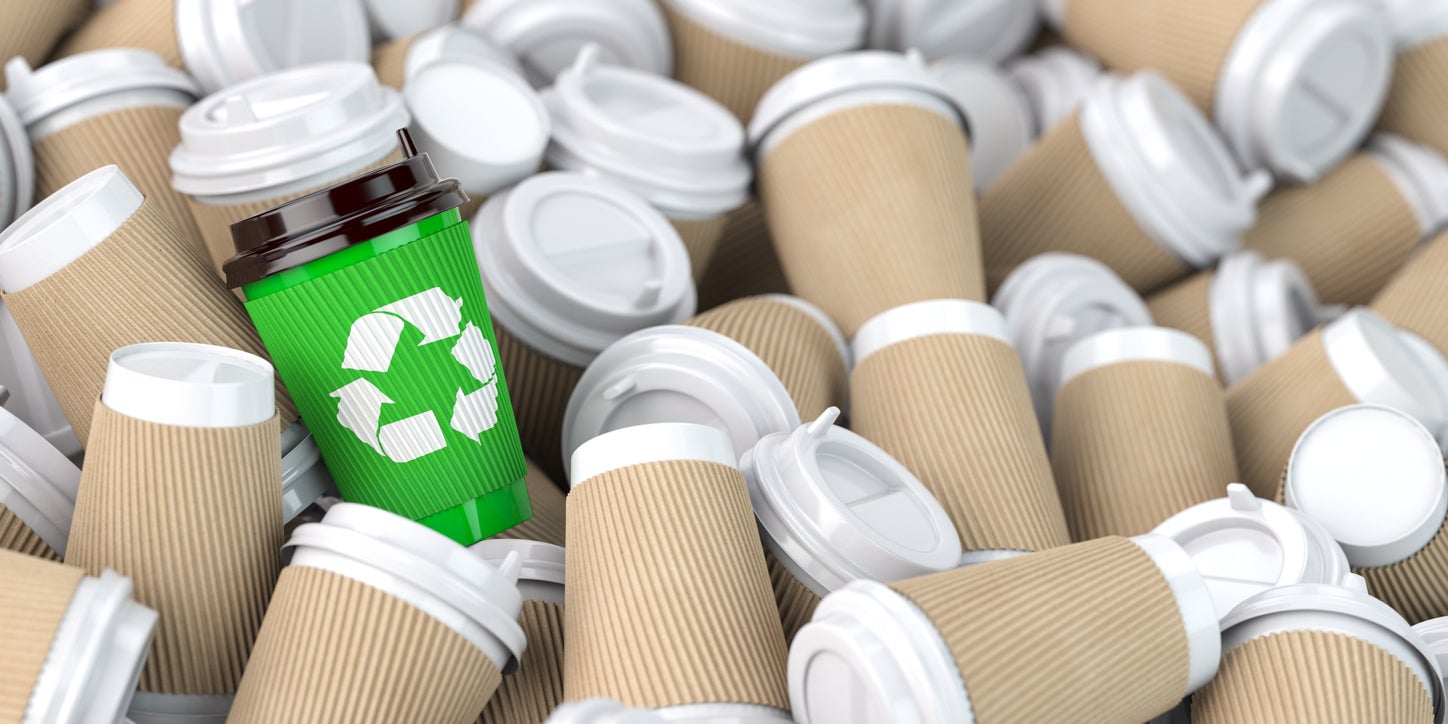The time has come to end our love affair with plastic takeaway cups
Plastic cups in the UK contribute to the same emission levels as 33,300 cars, many of us still don’t realise that plastic-coated cups cannot be recycled like other paper and cardboard


In 1987 Howard Schultz, then owner of a local coffeehouse business, set out his vision to put coffee at the forefront of American culture. He created a walk-in-walk-out coffee experience based on a fast, friendly service and epitomised by a cheerful paper cup. This cup, with its green siren logo, soon became synonymous with company culture and it wasn’t long before the Starbucks empire was booming. With this, our global obsession with on-the-go coffee took hold.
Fast forward 35 years and Schultz’s shining dream is in danger of becoming an environmental nightmare. The takeaway cup – once heralded for its convenience – has grown into a major environmental blight and consumers are fast falling out of love with a product once so enticing.
This reaction is unsurprising when one looks at the statistics. According to Starbucks itself, 600 billion paper and plastic beverage cups (many of them takeaway coffee cups) are distributed worldwide each year. In the UK alone we dispose of 2.5 billion cups annually. This number is set to increase, with the WWF forecasting that by 2030 the UK will use 33 per cent more cups than it does now.
The environmental impacts of this are as wide-ranging as they are alarming, even before considering the extra waste of plastic lids, straws, and stirrers or the impact of plastic production. Because of their polyethene lining, the vast majority of takeaway cups do not bio-degrade and are notoriously difficult to recycle. Within the UK, only one in 400 cups is recycled. The rest end up either as long-term litter or in landfill generating 152,000 tonnes of carbon dioxide a year – the same emission levels as 33,300 cars.The problem is fuelled by a lack of consumer understanding, as three out of four wrongly believe these plastic-coated cups can be recycled in the same way as other paper and cardboard.
Thankfully, as the problem grows, so too do the solutions. TV documentaries like theBBC’s Hugh’s War on Waste and David Attenborough’s Blue Planet II have ignited public and corporate awareness over the dangers of throwaway culture. In the last five years there has been an explosive growth in purpose-led businesses developing sustainable packaging, including reusable, compostable, biodegradable, and even edible solutions.
This makes one thing clear. The problem is no longer that there are no sustainable alternatives to plastic-coated takeaway cups. In fact, perhaps for the first time ever, both the sustainable alternatives and the public desire to utilise them exist. The remaining problem is the apparent reticence of major coffee chains to endorse these products. Some chains have been historically slow to accept responsibility for the waste they generate and to implement genuinely sustainable initiatives and more environmentally friendly products.
When questioned about their astounding waste levels, many coffee chains give the same answer. That consumers are unwilling to accept the expense and inconvenience of more sustainable alternatives. Some go as far as to say that traditional takeaway cups are so synonymous with their brand identity that customers would not accept a move away from it.
Read more:
To me, this is simply an excuse. An excuse indicating a staggering lack of faith in their customers. Since launching our first pilot of ButterflyCup in the UK last year, we’ve been astounded by the level of consumer support for the product. Indeed, it was public – more than policy or industry - support that facilitated our official UK launch. A recent poll found most consumers identify themselves as ‘environmentally aware’ in their buying habits, and 74 per cent are willing to pay more for sustainable packaging.
Fortunately, major chains are cottoning on to shifting customer priorities. They are realising that using customers as an excuse to resist change is increasingly unpopular, and are starting to make tentative steps towards improvement.
We are on the cusp of an extraordinary revolution – in consumer sentiment and in the increasing availability of viable alternative solutions to support and drive necessary change. It is now critical that we harness this energy without further delay or prevarication and start rolling out fully sustainable alternatives across all our coffee chains.
Howard Schultz built his company on the dream of putting takeaway coffees at the forefront of our society. We must act now to stop this dream from becoming an irreversible environmental nightmare.
Tommy Mc Loughlin is CEO of ButterflyCup, a fully recyclable, plastic-free, bio-degradable paper cup
Join our commenting forum
Join thought-provoking conversations, follow other Independent readers and see their replies
Comments
Bookmark popover
Removed from bookmarks